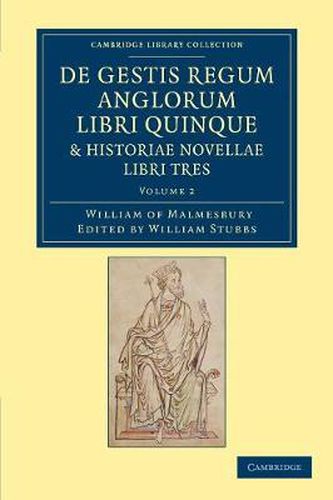Readings Newsletter
Become a Readings Member to make your shopping experience even easier.
Sign in or sign up for free!
You’re not far away from qualifying for FREE standard shipping within Australia
You’ve qualified for FREE standard shipping within Australia
The cart is loading…






Consciously modelling himself on the Venerable Bede, William of Malmesbury (c.1090-c.1142) was one of the most learned of all the medieval chroniclers. In this second volume of a two-volume set, published between 1887 and 1889, editor William Stubbs (1825-1901) presents the last three books of William’s Gesta regum anglorum (‘Deeds of the English Kings’), which are concerned with post-Conquest events up to the reign of Henry I. Although William’s reliance on contemporary chroniclers makes these books less independently valuable, they nonetheless contain much interesting material drawn from the author’s own experience. The Gesta is followed by the Historia novella (‘Modern History’), a later work in annalistic form - covering events from 1128 to 1142, including the ‘anarchy’ of King Stephen’s reign - which seems to have been unrevised and unfinished before William’s death. Stubbs’ substantial preface provides a detailed critique of the literary and historical value of William’s Latin writings.
$9.00 standard shipping within Australia
FREE standard shipping within Australia for orders over $100.00
Express & International shipping calculated at checkout
Consciously modelling himself on the Venerable Bede, William of Malmesbury (c.1090-c.1142) was one of the most learned of all the medieval chroniclers. In this second volume of a two-volume set, published between 1887 and 1889, editor William Stubbs (1825-1901) presents the last three books of William’s Gesta regum anglorum (‘Deeds of the English Kings’), which are concerned with post-Conquest events up to the reign of Henry I. Although William’s reliance on contemporary chroniclers makes these books less independently valuable, they nonetheless contain much interesting material drawn from the author’s own experience. The Gesta is followed by the Historia novella (‘Modern History’), a later work in annalistic form - covering events from 1128 to 1142, including the ‘anarchy’ of King Stephen’s reign - which seems to have been unrevised and unfinished before William’s death. Stubbs’ substantial preface provides a detailed critique of the literary and historical value of William’s Latin writings.